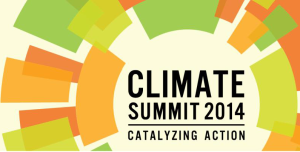Actions always speak louder than words but a document coming out of the UN climate summit last week has the potential to halve the world’s natural forest loss within six years, and to end it within sixteen.
The New York Declaration on Forests is a non-legally binding political agreement that has been endorsed by 32 national governments, including Canada[1] ; 40 major corporate

enterprises (including General Mills, Johnson & Johnson, Kellogg’s, McDonalds, Nestle, Procter & Gamble, Sobeys, Unilever and Walmart); 16 indigenous peoples’ organisations; and some 49 environmental groups (including the Environmental Defense Fund, Forest Ethics, Natural Resources Defense Council, Rainforest Alliance, Sierra Club and WWF). Enough fire power one would think to make sure something happens.
About 13 million hectares of forests (mostly in tropical countries) continues to be lost every year, mainly because of the clearing of land for commodities such as soy, palm oil, beef and paper. Infrastructure, urban expansion, energy, mining and fuel wood collection also contribute in varying degrees. What the endorsers are promising to do is to work together to eliminate or significantly reduce deforestation and to restore existing degraded landscapes and forest lands. Collectively, the backers claim their efforts could save between 4.5 billion and 8.8 billion tonnes of carbon emissions per year by 2030: the equivalent of taking all the world’s cars off the road. Forests represent one of the largest, and most cost-effective climate solutions available today, claims the document. Take a look at the work already underway or pledged. It’s impressive.
[1] Canada is regarded as a global leader on many forestry issues. Its net deforestation rate is minimal (0.01%) and it contains almost 40% of the world’s independently third-party certified sustainable forests.
P.S. Don’t forget PPEC’s half-day seminar Paper Facts and Fiction November 12. More details here.

Truly appreciate information that provides a “balance” to the information that perceptibly is overwhelmingly negative. With the right approach, there is a light at the end of the infinite tunnel.